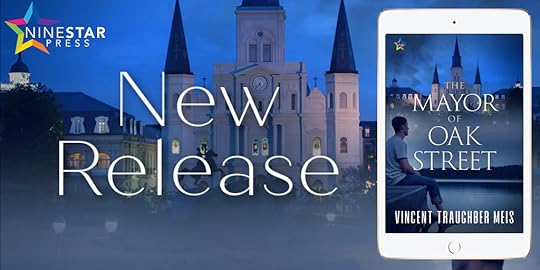Rick R. Reed's Blog, page 16
June 23, 2021
NEW AND NOTABLE: The Illhenny Murders by Winnie Frolik
Title: The Illhenny Murders
Author: Winnie Frolik
Publisher: NineStar Press
Release Date: 06/21/2021
Heat Level: 2 - Fade to Black Sex
Pairing: Female/Female
Length: 67500
Genre: Historical, LGBTQIA+, genre, historical, crime, lesbian, 1930s, private detective, district nurse, murder
Add to Goodreads
DescriptionDistrict Nurse Mary Grey saves the life of young architect, Anthony West, when he is involved a car wreck, only for West to tell her it was no accident. Someone tried to kill him. Mary is skeptical at first, but when West dies, she’s determined to investigate the matter. More blood is spilled, and Mary becomes embroiled in a tangled web of intrigue and murder as she joins forces with exiled Jewish German detective Franz Shaefer. And on top of everything else, Mary finds herself dangerously attracted to Anthony’s beautiful and unattainable sister Harriet. Excerpt
The Illhenny Murders
Winnie Frolik © 2021
All Rights Reserved
October 1936, Illhenny, England
It was no longer night in Illhenny, but not quite morning. Those weird in-between hours, when the darkness began to retreat but the sun had not quite shown its face. Although at this time of year, the best Illhenny could hope for was some feeble rays of light peeking out from behind the fierce clouds dominating its sea line. Still, sunny or not, people had begun to stir. Fishermen went off in their boats to cast their nets and haggle with the sea. Tradesmen set out to open for the day. Farm folk had cows to milk and livestock to feed. Mothers began coaxing surly children from their beds to have breakfast before making their way to school. And the district nurse set off on her rounds.
District Nurse Mary Grey had known she would be quite busy that day. In preparation, she had eaten a solid, manly breakfast, and packed a ham sandwich for later. She wore an oversized knitted gray-green sweater, gifted to her by her sister, over her uniform to face the weather. She rode her BSA motorbike. Some uncharitable souls might have noted the bike was over a decade old, and hardly ideal for inclement weather. And in the UK, of course, inclement weather tends to be the norm. No matter. Mary loved the motorbike from the moment it had been issued to her by the Rural Nurses Association. She loved how the wind whipped in her face when she rode it full throttle. She loved the sense of power between her legs. She loved how speedily it could get her to her appointments. She loved occasionally beeping to people she met on the ride. Most of all, she loved the freedom and independence her motorbike represented. She even enjoyed cleaning it and keeping it fueled and oiled. Mary had never ridden a horse, let alone owned one, but she imagined her love for her motorbike was akin to what a rider might feel toward their faithful steed.
Mary rode her bike past the bakery, post office, the vicarage, and the forge. Her first task of the day was to check in on Mrs. Simpson, who’d recently had surgery in London. She was a widow of some sixty years of age, living on a small pension after her husband’s death.
“You need not have come, my dear,” Mrs. Simpson told her. “As you can see, I’ve made a full recovery.” To punctuate her point, Mrs. Simpson did an elegant little curtsey. She was surprisingly limber for a woman her age.
“You certainly are looking better. You don’t seem to have any trouble moving at all now,” Mary noted.
“No. In fact, I took a long walk around the village yesterday and will take another today.”
“You didn’t mind the cold?”
“Oh no! I found it quite refreshing,” Mrs. Simpson proclaimed. “There’s nothing like fresh sea air and exercise for one’s health, is there?”
“No argument there,” Mary agreed. “Will you be going to tomorrow’s meeting of the Illhenny Women’s Society?” Mrs. Simpson was known for her needlework and her keen interest in village affairs.
“Wild horses couldn’t keep me away. We are going to start decorating the church for Christmas. I picked up some new items in London to show everyone! There’s no place like London for shopping.”
“There certainly isn’t. In fact, I’m taking the train down tomorrow to stay with an old friend of mine for a couple of nights while her husband’s away.”
“Wait, is that your friend Phyllis?” Mrs. Simpson asked. “You’ve visited her before, haven’t you?”
“Well, her husband travels regularly, and she likes the company,” Mary explained, not making direct eye contact with Mrs. Simpson.
“Oh, well, that’s very kind of you then,” Mrs. Simpson remarked. “How exactly do you and Phyllis know each other?”
“I met her when I was studying at the Queen’s Institute for Nurses in London.” This time Mary was on solid ground. “And we’ve stayed in touch. You know, I really have to get on to my other appointments.”
“Of course, dear, of course.”
Mrs. Simpson waved a cheerful goodbye and Mary rode off.
Mary next called on rheumatic old Caleb Barnaby. Caleb was a grizzled fisherman with several teeth missing, but one molar long and sharp as a harpoon. He’d been a big man once but in the last year or so had begun to lose weight and his clothes now hung on him rather alarmingly. He lived quite alone with only a large ginger cat, Ahab, for company. His rooms were shabby and dark, with only a single window, but they did have one charm—handcrafted shelves filled with little birds, fish, seashells, deer, and other creatures, all beautifully carved out of wood by none other than Caleb himself. Caleb’s whittling and carpentry were famous in Illhenny. After coming in, Mary, as usual, opened the window to air the room a little, while Caleb groused.
“Just kill me all the faster, the chill air will.”
“No, it won’t.”
“Will too!” Caleb retorted. “Cold gets worse every year for me old bones.” He gave a melodramatic sigh. “This will be my last winter, it will. Ought to start planning my funeral.”
“What would you have them write on your headstone?” Mary asked, amused.
“Don’t want a headstone,” Caleb pronounced. “Waste of time and stone if you ask me. Don’t want to be left in a box in the ground to rot either. I’d rather be taken by the wind or the sea. That way, at least I’d get to travel a b—”
There was a loud crashing sound and a startled Mary turned just in time to see a pile of wooden carvings on the floor while an orange blur raced around a corner and out of sight.
“Go ahead and run, you coward! You cur!” Caleb shouted. “If I ever get my hands on you, I’ll turn you into slippers!”
Mary had heard similar threats from Caleb before regarding Ahab’s crimes, and knew them to be empty. She instead set out about picking up the wooden figures and returning them to their rightful place. As she did so, she spotted an envelope hidden in a cleft among the shelves and, on an impulse, took a peek at its contents.
Much to her amusement, it was filled with cheap little pictures of women in various stages of undress. Pornography and smut were illegal in England, but that didn’t seem to diminish its popularity one jot. Most of the women were simply posing, but some of them were more active. In fact, several of the photos included men as well, engaging in all sorts of calisthenics with the women. Mary hurriedly put the envelope away.
“What you doing now?” Caleb asked.
“Nothing! Just examining your workmanship. How about I put on the kettle?”
“Tea? What good is tea? Now whiskey, aye, that’s proper medicine. I’ll have me a shot now.”
“But it isn’t even noon,” Mary pointed out.
“Exactly. I need breakfast!” Caleb drained the shot with satisfaction. “Come you, nurse, join me in a tipple. It’ll put some color in your cheeks, do you a load of good.”
“Sorry, but I’m not allowed to drink on duty. Those are the rules.”
“Too many damned rules,” Caleb grumbled. “That’s what’s wrong with the world these days.”
“I don’t know that the problem is the number of rules themselves,” Mary said thoughtfully, “so much as who makes them.”
“Hmph. Speaking of people who make the rules, Lord Pool’s called a town meeting tonight at the dance hall.”
“A meeting? About what?”
“Don’t know. Didn’t say anything. But his friend from next door is going to be there as well.”
“I heard The Laurels had just been rented out to some young man from London,” Mary mused. “I wondered what that was about. We don’t get many visitors from London here. In fact, we usually don’t get any.”
Caleb scowled. “No good will come of this. I can smell it. You mark my words!”
Mary did not respond to this premonition but kept to her schedule. As she rode past Mr. Legge’s tobacco shop, she saw pretty, young Mrs. Legge assisting Mr. Winthrop, the vicar. Mr. Legge, who was quite a bit older than his wife, stood directly outside the shop, engaged in an argument with Dick Townley, Lord Pool’s gamekeeper.
“No more credit for you, you wastrel! You ever darken my door without the money you owe me, and it’ll be my boot up your arse!”
“I’d like to see you try.” Townley spat on the ground, but he left the shop empty handed.
Mary passed Constable Evans as well. He was still a young man with plump cheeks, red as apples.
“Hello, Nurse Grey.” He tipped his hat to her. “Busy day, is it?”
“It’s always busy. What about you?”
“Getting a cat out of a tree has been the highlight of my morning. Had some more excitement yesterday though. Another one of those tramps came around and I had to clear him off. There seem to be more of them every week.” He frowned.
“The slump perhaps,” Mary suggested. “Too many poor souls out of work with nowhere to go.”
“Maybe, but they can’t come here,” Evans retorted. “I have my orders to keep them out. Well, I’ll leave you to your caseload.”
The saddest part of Mary’s day was visiting poor Annie Capman with her consumption. Annie was from an industrial town in the north but, because of her health, she’d moved to Illhenny in hopes the fresh sea air would revive her. Sadly, while Annie did enjoy a respite from breathing in black smoke and soot, it soon became clear her days were numbered no matter where she lived. The other villagers in Illhenny kept their distance from the little cottage Annie lodged in, fearing contagion. Annie’s coal and groceries were always delivered and left outside. Mary entered the cottage directly with a key left underneath a stone in the yard to see Annie’s skeletal figure in bed, swallowed up by comforters and sheets.
“Mary.” Annie’s hollowed pale face shone at the sight of the nurse. “It’s so good to see you.”
“How are you feeling today, Annie?” Mary asked.
“Tired,” Annie replied. “I know you say it does me good to walk outside, but today I’m afraid I haven’t the energy for it.”
“That’s all right, Annie,” Mary reassured her. “Let me open the windows at least and get some fresh air in for you. I’ve got another bottle of that tonic you like.”
Mary dosed Annie, helped her bathe in the wash basin, and combed her hair before tucking her into her newly changed bed with tea and biscuits.
“Rest now,” Mary told her as Annie shut her eyes and drifted off to sleep.
Mary’s final appointment of the day was at the Martins’ farm to check on Mrs. Martin and weigh the newborn twin boys who Mary had delivered herself just fourteen days before. This visit in particular gave Mary cause for worry. Not so much the twins themselves—they were both putting on weight nicely and had hearty lungs they kept in good order with constant roaring. No, the rest of the family concerned Nurse Grey. The birth of the twins had brought the total number of children at the farm to nine, all crowded together on top of one another. From the moment she entered the home, Mary was met with the smell of dirty nappies and unwashed dishes. Without electricity, plumbing, or running water, it was difficult to maintain even the most basic level of sanitation in the home. Mrs. Martin had dark circles around her eyes, like someone had smeared coal there, and a dull, blank stare. Her hair was tangled as a bird’s nest and she had a nasty cough as well. She was uncommunicative and answered questions with just a “yes” or “no.”
Finally, Nurse Grey had directed her questions to the eldest girl, Libby. Libby informed Mary that her mother hadn’t slept for days thanks to the twins’ constant bawling, and she had seemed off her food as well. Thirteen-year-old Libby had more or less taken charge of the household and the care of her younger siblings. Mr. Martin had not been present during the interview, and Eliza volunteered that her father had been spending less time than ever at home since the twins were born. His hours minding the farm had always been long, but now it seemed he didn’t come home most nights at all. Rather he went to The Mud Crab or slept in the barn, finding it more comfortable than the Martin household at present. Looking at the dirt and grime around her, as the twins began to bawl once more, Nurse Grey understood why. Still, the absence of a father and husband in the home was only making things worse.
“Is there anyone who could come and help your mum? A neighbor perhaps? Or family?”
Libby thought a moment. “Aunt Amy,” she said. “She’s Mum’s sister and she works as a housekeeper in Anchester.” Anchester was a market town some six miles distant.
“Would we have to send a message in person, or does she have a phone?” Nurse Grey asked.
“The house she works at has a phone,” Libby replied.
“Good! Do you know the number?”
Libby shook her head.
“That’s all right. Directory can probably find you the number as long as you know who and where her employer is.”
“I know that,” Libby stated firmly.
“Then run down to the call box by the post office. Here are some coins for the phone. Tell your aunt to come here as quickly as possible, assuming she can get the time off.”
Libby turned to go, and Mary called after her, “Remember to wear your mittens!”
Nurse Grey spent the next few hours doing her best to clean up around the household, having one of the children draw her water from outside, and delegating tasks of sweeping, mopping, and laundry. A hearty new fire was built to warm the place up a bit. The twins were fed, bathed, and changed. Meanwhile, Mrs. Martin was given hot tea and put to bed for some much-needed sleep. As Mary started making porridge for supper, Libby returned.
“I spoke to Aunt Amy and she spoke to her employer. She’ll be here tomorrow.”
“That’s wonderful news! But we will have to keep an eye on your mum’s cough too,” Mary told Libby. “If it gets any worse or lasts much longer, she may need to see a doctor.”
Libby nodded, though she did not look happy. “Doctors are expensive, ma’am.”
Nurse Grey sympathized. “I know. Hopefully, though, once your mum gets some rest, she will start to get better on her own. Make sure she rests by the fire and drinks lots of hot tea.”
By the time Mary left the Martins’, it was nearly time for the public meeting. And while Mary Grey was no native to Illhenny, a district nurse should always try to stay appraised of matters within the local community. She rushed to attend and managed to get in the doors of the local dance hall just before the meeting began. It seemed half of Illhenny was crammed into the room, seated in rickety folding chairs, and Mary despaired of finding a seat.
“Hey, Nurse Grey, come you here!” Caleb Barnaby gestured to Mary to join him on a bench and somehow managed to squeeze in room for her.
“Thank you, Caleb.”
“I may need you before the night is out,” Caleb told her. Mary looked around. The walls of the hall were still decorated with the cheap paper and tinsel from the last dance. The wooden floor was scuffed from constant use over the years, and the air permeated with the smells of resin, varnish, and dried sweat.
At the far end of the hall, at a makeshift podium, stood Lord Pool, darkly handsome in a Savile Row suit. Next to him stood a remarkably fair young man wearing cream colored linen slacks, with white-blond hair that he’d grown out to a shocking degree. There was also a large free-standing presentation desk; recognizable from the form, but with a curtain drawn hiding the main display.
“That must be Lord Pool’s friend,” Mary noted.
Caleb gave a rude snort. “Looks like a poofter to me,” he grumbled. “London’s full of nancy boys and perverts.”
Mary ignored this and waved to Mrs. Simpson across the room. At last, as the conversations in the seats built in a crescendo of curiosity, Lord Pool stood up to a microphone and, after a few staticky attempts, was able to make himself heard throughout the hall.
“I imagine,” he began, “you’re all wondering why I’ve called this meeting. Well, the reason is because I have decided to partake in an investment opportunity. And the opportunity in question directly involves all of you. As most of you well know, my family has been here for centuries. We consider ourselves deeply rooted within this community, and that its fortunes and ours are intertwined.” Lord Pool paused and looked around the room meaningfully. Not a whisper was to be heard. “Which is why it truly grieves me to say that Illhenny has for some years been in a state of decline.” Voices rose in a sudden murmur throughout the room. “Oh, it’s no one’s fault,” he continued, “but neither the fishing or agriculture around here are what they once were, and mining’s long gone. To survive, Illhenny must adapt with the times, which is why it is my great pleasure to introduce you to my old and dear friend, Anthony West, who happens to be one of England’s most promising young architects. Anthony?”
The blond man was passed the microphone and Lord Pool stepped aside, and then, to Mary’s surprise, left the podium altogether. It was almost as if he was fleeing the scene. Anthony West stared at a crowd full of strangers, eyeing him suspiciously, without quailing.
“As Edgar—I mean Lord Pool—just told you, I’m an architect,” Anthony began, “and I’m proud to announce that my next project will be—” He put his hands on the display case and drew away the curtain. “—a grand, new seaside resort, right here in your community!” Now visible were schematics for a very modern looking hotel in the Art Deco style, all windows and curved white walls, with a huge veranda positioned right along the beach.
There was a moment of stunned silence, and then the whole hall exploded.
“What about noise?” someone shouted.
“What about all the new traffic?” Mrs. Simpson fretted.
“We’ll be overrun with tourists,” Mr. Wilberforce lamented, and there came a chorus of agreement.
“You bastard!” Caleb Barnaby had risen to his feet, his face as red as a tomato, and screamed at Anthony West. “I knew something was up. I knew you were no good just looking at you! And I was right! You’re going to ruin this town!”
“Ruin it?” Anthony West was indignant. “I’m saving it!”
Mary noticed that Lord Pool was nowhere in sight.
“Bollocks! You’d turn this place into nothing more than a watering hole for rich fops like yourself!” The assertion on Caleb’s part prompted a resounding “aye” across the room.
“Yes, well, better your town had a few more fops like me than drunken oafs like yourself,” Anthony retorted frostily.
Caleb started striding to the podium.
“Wait a minute. What’s he doing?” Anthony wondered aloud.
“I’ll teach you a good lesson,” Caleb snarled, and young Mr. West looked alarmed. Fortunately, at that moment, Constable Evans intervened and manually escorted Caleb away. The meeting broke up in a general disorder.
PurchaseNineStar Press | Books2Read Meet the Author Born and raised in Pittsburgh, the Carnegie Library in Oakland was always my second home. I was diagnosed as being a high functioning autistic in college. I hold a useless double major in English literature and creative writing. I’ve worked at nonprofit agencies, in food service, and most recently as a dog-walker/petsitter but the siren song of writing keeps pulling me back into its dark grip. I have co-authored a book on women in the US Senate with Billy Herzig, self-published The Dog-Walking Diaries, and in 2020 my first novel Sarah Crow was published by One Idea Press. I live in my hometown Pittsburgh with my better half, Smoky the Cat. Facebook | eMailGiveawayJune 22, 2021
Pride 2021 Reading: CHASER and RAINING MEN

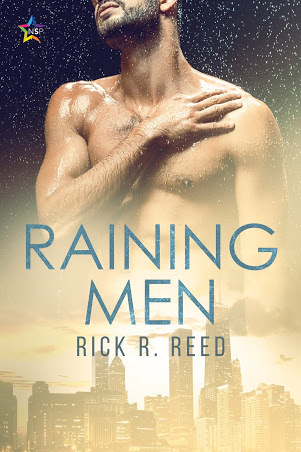
For #Pride2021 🏳️🌈, I'd like to highlight the novels I've written that have the most relevance to issues facing our #LGBTQ community.
Both CHASER and RAINING MEN deal with body image, sexuality, and self-esteem.
Get your copies from Amazon: https://www.amazon.com/gp/product/B075V3G2JX and other online retailers.
CHASERCaden DeSarro is what they call a chubby chaser. He likes his guys with a few extra pounds on them. So when he meets Kevin Dodge in a bar bathroom, he can’t help but stare. As far as Caden is concerned, Kevin is physically perfect: a stocky bearded blond. But Caden gets tongue-tied and misses his chance. When Caden runs into Kevin one night on the el train, he figures it’s fate offering him a second shot. Caden manages to get invited back to Kevin’s place for a one-night stand that turns into the kind of relationship he’s dreamed about. But the course of true love never runs smoothly—Kevin and Caden’s romance is no exception. When Caden returns from a few weeks away on business, Kevin surprises him with a new and “improved” body—one that fits Caden’s shallow friend Bobby’s ideal, but not Caden’s. Caden doesn’t know what to do, and his hesitation is just the opportunity Bobby was looking for. RAINING MENThe character you loved to hate in Chaser becomes the character you will simply love in Raining Men. It’s been raining men for most of Bobby Nelson’s adult life. Normally, he wouldn’t have it any other way, but lately something’s missing. Now, he wants the deluge to slow to a single special drop. But is it even possible for Bobby to find “the one” after endless years of hooking up? When Bobby’s father passes away, Bobby finally examines his rocky relationship with the man and how it might have contributed to his inability to find the love he yearns for. Guided by a sexy therapist, a Sex Addicts Anonymous group, a well-endowed Chihuahua named Johnny Wadd, and Bobby’s own cache of memories, Bobby takes a spiritual, sexual, and emotional journey to discover that life’s most satisfactory love connections lie in quality, not quantity. And when he’s ready to love not only himself but someone else, sex and love fit, at last, into one perfect package.
#ownvoices #loveislove
June 17, 2021
BASHED and Hate Crimes

For #Pride2021 🏳️🌈, I'd like to highlight the novels I've written that have the most relevance to issues facing our #LGBTQ community.
BASHED deals with the aftermath of a horrible #hatecrime and how it affects the victims and perpetrators.
If you want a copy, BASHED is available from Amazon at https://www.amazon.com/Bashed-Rick-R-Reed-ebook/dp/B08DTKLZ3V and other online retailers.
#ownvoices #gaybashing #ghoststory
Do you believe that real love never dies?
That's the premise behind my ghost/love story from NineStar Press, Bashed.
Bashed is a haunting blend of romance and suspense, wrapped up in a timely story that could have been ripped from today's headlines.
The GLBT Roundtable of the American Library Association gave Bashed a highly favorable review and recommended the book for public libraries.
In part, the review said:
"A gripping thriller told from multiple points of view, Bashed delivers what readers have come to expect from Rick R. Reed: a violent and emotionally wrenching tale of realistic horror. The story is told by three characters: two perpetrators of a horrifying hate crime, and the man who survived the attack...The violence is graphic, as is the sex, but neither is gratuitous..."

BLURB
It should have been a perfect night out. Instead, Mark and Donald collide with tragedy when they leave their favorite night spot. That dark October night, three gay-bashers emerge from the gloom, armed with slurs, fists, and an aluminum baseball bat.
The hate crime leaves Donald lost and alone, clinging to the memory of the only man he ever loved. He is haunted, both literally and figuratively, by Mark and what might have been. Trapped in a limbo offering no closure, Donald can’t immediately accept the salvation his new neighbor, Walter, offers. Walter’s kindness and patience are qualities his sixteen-year-old nephew, Justin, understands well. Walter provides the only sense of family the boy’s ever known. But Justin holds a dark secret that threatens to tear Donald and Walter apart before their love even has a chance to blossom.
THE TRUE STORY BEHIND THE BOOKSometimes, ideas come from real life. Such is the case with my novel, Bashed . For a lot of gay men and women, hate crimes are a fact of life. Many gay people have either themselves experienced the terror, violation, and persecution of being attacked simply for who they are (and whether the attack took the form of words, fists, or something more lethal) or, at the very least, they know someone who has. I've been lucky. I have no permanent physical scars. But I did come very close to experiencing a hate crime up close and personal (and I suppose one could argue that what I did experience was actually a hate crime) and that formed the basis for the inspiration of my novel. The title, of course, refers to being fag-bashed.
My close call came one October night several years ago back when I still lived in Chicago. I was once into what's affectionately called the "leather scene" and owned chaps, biker jacket, boots, and other accouterments that passed the dress code in either a gay leather establishment or a biker bar. That particular night, I had been hanging out at the Eagle, one of Chicago's foremost leather establishments. I had stayed late, arriving after midnight and leaving near closing, at close to four o'clock in the morning. I had made a new friend and we were making our way to my car, which was parked on a side street that ran parallel to St. Boniface Cemetery. It was a very dark and quiet side street, made all the more so by the late night hour. My companion and I weren't thinking about things like fag bashers or hate crimes.
But we suddenly were when we noticed an idling old car parked just opposite from my own. The car was a souped-up muscle vehicle of some sort and inside it, we could see several dark figures, all turning their heads, alert, as we approached. Both of us tensed and quickened our pace. Even in the middle of a metropolis like Chicago, it was easy to feel vulnerable and alone. And we felt even more vulnerable when the still of the quiet night was broken by the sound of car doors opening. Suddenly, my friend and I stopped, feeling exposed in our leather gear, as four young men emerged from the car. To the man, they all sported shaved heads and were dressed in uniforms of baggy jeans and hoodies.
And one of them was carrying an aluminum baseball bat.
They didn't call us "fags" or "queers". They didn't say anything. Their silence was perhaps more frightening than if they had hurled epithets our way. To reach my car, we would have to walk right by them...and it didn't appear as though they were planning to let us pass.
It was like being confronted by a Grizzly in the woods, or a lion in the jungle. What do you do? Run the other way, knowing that four strong men are on your heels? Try to get to your car and hope that the baseball bat was for a late night game of sandlot?
We froze. The four, as a unit, moved closer. One of the guys, the one with the bat, grinned, swinging the bat slightly.
This was a moment of irrational fear. My heart pounded. A trickle of sweat ran down by back.
In books, they call what happened next predictable or deus ex machina, but at just that moment, one of Chicago' finest rolled down the quiet street, very slowly, toward us. The men got in their cars quickly. And so did we.
Thankfully, I do not know what the outcome of that night would have been had not the police come along on such a fortunate patrol.
But the incident did stick with me for many years, until I got around to dramatizing the incident as the opening to Bashed. But in my fictional world, no police car came to the rescue and the pair of guys emerging from the leather bar end up bashed very badly...with an aluminum baseball bat. It’s chilling to think that one of your characters could have been you, a you that might not have survived to tell a tale again.
BUY NineStar Press Amazon
June 16, 2021
Inspiration and THE Q

The Q is one of the books I'm most proud of. It also has the distinction of being the hardest to classify.
It chronicles one night at a small town gay bar in the foothills of the Appalachians (which is where I grew up) where all the locals gather. Through the course of one revelatory night, a memorable cast of characters come forward to share their stories—there’s heartbreak, missed connections, falling in love, falling out of love, making tough decisions, the exposure of secrets…and a lot more.
There are a few books that inspired my desire to tell a story through individual glimpses into different lives over the course of one pivotal night. Spoon River Anthology, Winesburg, Ohio, and the Elizabeth Strout books, Olive Kitteridge and Olive, Again. All of these books basically weave short stories together to create a novel. I loved that idea and have had it in the back of my head for a while.
On a visit to my hometown, which is on the Ohio River and in the Appalachian foothills, I went with my sister one night to a dance club and casino in West Virginia. To draw people in to use the casino, the place has a live band for dancing every Saturday night and I watched all the regulars who come to dance and socialize and thought how they each have a story. And therein my idea for The Q was born.
ABOUT THE BOOK
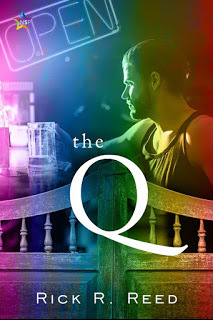
Step out for a Saturday night at The Q—the small town gay bar in Appalachia where the locals congregate. Whose secret love is revealed? What long-term relationship comes to a crossroad? What revelations come to light? The DJ mixes a soundtrack to inspire dancing, drinking, singing, and falling in (or out) of love.
This pivotal Saturday night at The Q is one its regulars will never forget. Lives irrevocably change. Laugh, shed a tear, and root for folks you’ll come to love and remember long after the last page.
BUY THE Q
June 15, 2021
NEW AND NOTABLE: The Mayor of Oak Street by Vincent Meis
Title: The Mayor of Oak Street
Author: Vincent Traughber Meis
Publisher: NineStar Press
Release Date: 06/14/2021
Heat Level: 2 - Fade to Black Sex
Pairing: Male/Male
Length: 88400
Genre: Contemporary, LGBTQIA+, age-gap, coming-of-age, coming out, college, political, friends to lovers, period piece, reunited
Add to Goodreads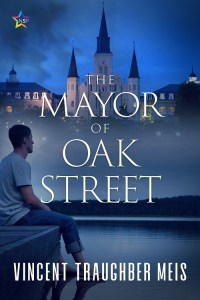
Description
In the 1960s, Midwestern boy and Boy Scout, Nathan delivers newspapers and mows lawns. Nathan uses his cover to move about yards and sneak into the homes of his neighbors, uncovering their secrets.
In high school, one of the local misfits introduces him to diet pills, which help him overcome his shyness. In an amphetamine high, he meets Cindy, who he hopes will steer him along the “morally straight” path of the Boy Scout Oath he swore to.
Nathan is infatuated with a young doctor down the street, Nicholas (Dr. B), who embodies all the things his mother would love him to be. On one of his secret forays in Dr. B’s house, he hides in a closet and witnesses his idol having sex with man while the wife is out of town. Dr. B’s affair leads to tragedy, forcing the doctor to leave town.
At college in New Orleans, Nathan meets a group of rebels and expands his drug use. Marc, a bisexual Cajun charmer becomes Nathan’s first male sexual experience, but promptly leaves town.
Nathan has a chance encounter with Dr. B, who has moved to New Orleans. Dr. B is in a relationship, but still closeted. Frustrated by Dr. B’s cool reaction, Nathan goes on a six-month binge of amphetamines and anonymous sex. On one night of debauchery, he overdoses and ends up in the emergency ward.
Nathan’s near death rallies Dr. B and Nathan’s other friends to force him into rehab. On the way home from work, Nathan witnesses the gruesome aftermath of the 1973 Up Stairs Lounge fire that devastated the gay population of New Orleans. As a result of the fire, Dr. B’s live-in boyfriend leaves town, freeing Dr. B to explore his feelings for Nathan.
ExcerptThe Mayor of Oak Street
Vincent Traughber Meis © 2021
All Rights Reserved
The Sangamon flows muddy and rank through the corn and soybean fields of central Illinois, giving its name to my city and the lake it fills on the south side before continuing its meander west. One of its tributaries, the even lazier and muddier Harold’s Creek, ran practically up to my back door in its own journey through the woods behind the homes on Oak Street.
The afternoon sun filtered through the tall trees, warming my shoulders as I walked along the creek, imagining building a raft like I had seen my brother and his friends do a few years before. I would ride it down the creek to the Sangamon and into the Illinois, eventually reaching the Mississippi. The Mississippi would take me to New Orleans, a city memorialized in song, literature, and film as a place of wonder. It wasn’t that I needed to run away like Huckleberry Finn. I hadn’t yet learned to hate everything the Sangamon gave its name to. It was a boy’s fantasy brought on by the heat of summer and the mesmerizingly sluggish flow of water.
I heard a branch snap deep in the woods. I often saw hobos from the nearby Wabash Line wandering in the woods, and my mother told me I needed to avoid them, but I sometimes watched them from behind a clump of bushes. My eyes darted around the area and saw nothing. I glanced at my watch. Time to go. For most kids, these were the carefree days of summer, but I had things to do. From the creek, I walked up the hill, through our backyard, and out to the street.
Mrs. Sloan’s heavy oak door hung wide open while a screen kept the swarms of late summer flies and mosquitoes at bay. I put my face to the mesh in what felt like an invasion of her privacy, causing me to tingle from the top of my head down to my big toes.
“Hello? Mrs. Sloan?” I shouted into the dim interior of the hall.
No answer.
I opened the screen door haltingly and stepped inside. The door creaked shut, sounding painful in the silence of the house. I took a step, and then another. My legs shook. I peered to the right into the living room and left into the dining room. A force had taken control of me and pushed me on, my sneakers barely touching the carpet.
I went as far as the kitchen, passing two empty bedrooms on the way. Her purse sat on the yellow chrome Formica kitchen table, the keys to her Oldsmobile right next to it. Out the kitchen window, I searched for her floppy straw hat in the sunny backyard. She was neither in the garden where she often tended her vegetables nor in the lawn chair where she sometimes sat, large sunglasses on her nose and a cocktail in hand. I took note the lawn needed mowing.
Nylons hung over the bathroom shower curtain rod, hypnotically swaying in the breeze from the open window. Though we called her Mrs. Sloan, I had never heard of a Mr. Sloan. My father once complained about entering the bathroom and finding my mother’s nylons drying in plain sight. I wondered if Mrs. Sloan was sad living alone or happy she had the freedom to do what she wanted.
I should have been scared of her coming home and finding me lurking in her house, but a stronger force blocked the fear, a compelling energy moving my mind and body, making me feel impervious to danger. I continued down the hall to the living room, stopping to gaze at each of three framed needlepoint messages: “There’s nothing to fear but fear itself,” “A cheery smile makes life worthwhile,” and “You belong among the wildflowers.”
I had come to Mrs. Sloan’s door in my rounds, collecting for my paper route. She was a month behind in her payments. And I rationalized my invasion of her home out of concern for her welfare. My mother once said she wouldn’t be surprised to find her passed out drunk on the front lawn one day. My brother in high school sometimes came home from a night of drinking with his buddies and would collapse face down on his bed in our shared room without removing his clothes or shoes. One time, he ended up on the floor. Perhaps Mrs. Sloan had fallen like my brother. Perhaps she had fallen asleep in the bath and was at risk of drowning like I had seen on a television program.
I spent a few more minutes in the house before exiting through the front door into the calm and quiet on Oak Street. I continued up the block to do the rest of the collections. That night I drew a floor plan of her home, noting doors and windows. My brother called me a weirdo when the first thing I looked at in the Sunday paper was the page with the floor plan of a new house on the market while he went for the sports section, my father the news, and my mother the book reviews. I also scribbled notes about Mrs. Sloan’s house: the color and shape of her purse, the black-and-white photo of a somber older couple in the living room, the buff-colored nylons, the approximately twelve-inch cross hanging over her bed, and the needlepoint messages.
Before I entered my teenage years, I would know my way in and out of most every house on the block without being discovered. It was the Midwest. It was the ‘60s. Crime happened elsewhere. In addition to delivering papers, I mowed lawns. I could cross barriers, move within fences, and befriend dogs. Access. Getting inside the house was usually the easy part.
Everybody told me my paper route and lawn-mowing jobs would be good experience though I had no idea how much I would learn about myself, about others, about life, the good and the bad. I could assume the face of the upstanding neighborhood boy, appearing at their doors to collect subscription payments, smiling and making small talk while below the surface I was another person, motivated by desires they would never understand.
The second time I entered a home was as spontaneous as the first. It was the Pruitts’. While mowing the front lawn, I noticed Mrs. Pruitt lock the front door, take her two identically dressed little girls by the hand, jump into their Ford station wagon, and drive off. When I got around to the back of the house, I spotted the kitchen door standing open, beckoning me. I turned off the mower so I would hear if the car returned. I went into the kitchen. My mother would die rather than let our kitchen fall into such disorder; the sink filled with dirty dishes, and the kitchen table covered with open schoolbooks and scattered papers.
A half-full milk carton sat on the counter. I opened the fridge and saw a whole shelf of soda pop. I took an orange Crush and drank it as I did a quick tour of the house. Not much interesting. The rest of the house was as messy as the kitchen. I finished the soda outside, threw the bottle in the trashcan, and finished mowing the lawn. Before I went to bed that night, I drew a floor plan of their three-bedroom and put it in a folder with Mrs. Sloan’s.
I thought of these intrusions as accidents, isolated incidents that wouldn’t be repeated. But images of those escapades kept dancing through my head, enticing me to do it again. The rush of danger, the real possibility I might be caught, was like a drug. At the time I was still ignorant about drugs and addictions, but my body clearly knew sensations it wanted to revisit. I managed to stave off my urges for a few months. I turned twelve over the summer, and several of my customers who had heard it was my birthday tacked on a bit extra to their payments.
Lawn-mowing season came to an end as the weather turned cold, and we had our first snowfall. Soon after, I started receiving calls about paper holds for the Thanksgiving holidays. To me, they might as well have been invitations. I prayed it didn’t snow as the soft whiteness would show the hard dirty prints of my boots, a trail of my activities. I had to start thinking about such things: tracks I might leave, who in the neighborhood tended to snoop out their windows, or how often people left doors unlocked, windows open.
I made a point of being friendly with the dogs on my street as I knew my extracurricular activities at houses with animals could be a problem. The Jackmans had a golden retriever. I’d received notice to put their paper on hold for five days, making me guess they weren’t going to leave the dog in the house for that length of time.
When I did my collections the week before Thanksgiving, I casually mentioned to Mrs. Jackman that I had received the hold notice. People loved to give out information they didn’t have to. She revealed they were going to their lake house in Arkansas. Butch was curled up at her feet. He raised his head as she took a ten out of her wallet and gave it to me. She told me to keep the change, and I thanked her profusely while I tore off her receipt.
I reached down to pet the dog. “I guess Butch is going to get a vacation too.”
“Oh, yeah. He loves it down there.”
Bingo, I was in. After our Thanksgiving meal, Dad and my brother watched the football game on TV while Mom cleaned up. I went to my room, saying I was going to read. Nobody thought it was odd. In my family, everybody did pretty much what he or she wanted. Normally, after a Thanksgiving meal, Dad and my brother passed out in front of the TV, and Mom curled up in a chair to read after cleaning up the kitchen. They had all had a lot of wine at dinner, including David, who my parents allowed to drink though he was only sixteen, something about him learning to drink responsibly at home keeping him from being irresponsible when he went out. I wasn’t sure that was working.
PurchaseNineStar Press | Books2Read Meet the Author Vincent Traughber Meis started writing plays as a child in the Midwest and cajoled his sisters to act in performing them for neighbors. In high school, one of his short stories won a local contest sponsored by the newspaper. After graduating from college, he worked on a number of short stories and began his first novel. In the 1980’s and 90’s he published a number of pieces, mostly travel articles in publications such as, The Advocate, LA Weekly, In Style, and Our World. His travels have inspired his five novels, all set at least partially in foreign countries: Eddie’s Desert Rose (2011), Tio Jorge (2012), and Down in Cuba (2013), Deluge (2016) and Four Calling Burds (2019). Tio Jorge received a Rainbow Award in the category of Bisexual Fiction in 2012. Down in Cuba received two Rainbow Awards in 2013. Recently stories have been published in three collections: WITH:New Gay Fiction, Best Gay Erotica Vol 1 and Best Gay Erotica Vol 4. He lives in San Leandro, CA with his husband. Website | Facebook | Twitter | InstagramGiveawayJune 7, 2021
My bittersweet love story about finding love after great loss, HOMECOMING
Have you read my bittersweet love story yet? It's all about finding life and love after unimaginable loss...
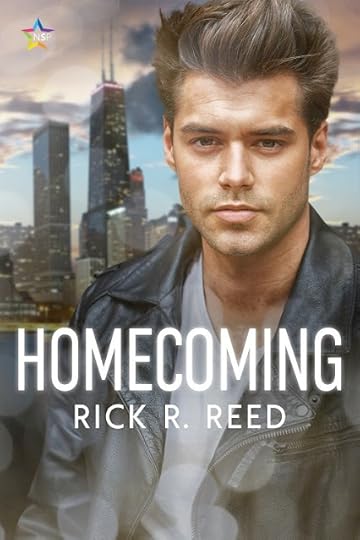 About the Book
About the BookAfter losing his partner Toby, Chase faces a long, painful road back to life and love.
At first, he doesn’t see how he can go on, but then Chase and Toby’s old friend Mike cajoles him into returning to Chicago for the annual International Mr. Leather Competition. There Chase revisits a world of hot, casual sex that he had forgotten existed, meets a friend who cares more for him than he ever realized, and discovers the possibility that he just might be able to move on without betraying the memory of his late partner.
Will Chase find his way back once more to life? To love? And will he find that place he’s been missing? Home. You’ll have to experience the heartrending journey firsthand to find out.
Excerpt
Homecoming
Rick R. Reed © 2020
All Rights Reserved
Chapter One
Toby tried his best to stay awake.
He was on the Microsoft shuttle, traveling home from his job at Microsoft’s Redmond campus, to his condo in Seattle’s Capitol Hill neighborhood. It was a long commute, but he had his phone, his weariness (which meant he sometimes slept through the trip), and an overactive imagination for company and entertainment. The commute was made longer because he had to transfer to a bus once he got to downtown Seattle to get close enough to home. Home was a two-bedroom with amazing views of the Space Needle and Lake Union he shared with his soul mate, his beloved, his special one, Chase.
He was grateful every single day for the wonderful life he’d built for himself. He was one of those lucky folks who could hardly imagine how things could possibly be any better.
The familiar scenery passed as the bus drew closer to closer to downtown.
He wished he could banish this fatigue, but it had been a long day and a long week and there simply wasn’t much fuel left in his tank.
But it was his birthday, for god’s sakes ! He wanted to celebrate—so much. It was a milestone, after all. One doesn’t turn forty every day.
If he came home exhausted and ready for bed—and sleep—at nine o’clock, it would only validate the sinking feeling Toby had that forty was the beginning of the long path down that particular piece of geography known as “over the hill.”
He hoped seeing Chase at the door to their shared home would revive him enough to at least maybe order a Pagliacci pizza for delivery and to stream a couple of episodes of Unforgiven on Britbox.
Now, that sounded like a perfect evening and a birthday celebration ideally suited to his introvert leanings. He was grateful once again he and Chase hadn’t made big plans for the 4-0. They could have a nice dinner over the weekend, perhaps, at his favorite Korean street-food eatery, Revel, over in the Fremont neighborhood. Or maybe they’d splurge, as they had last year, and try to get a table at Canlis.
To keep himself awake, he brought his phone out of the pocket of his jeans and, like everyone else on the bus, stared down at the illuminated screen.
He checked Facebook and found it flooded with birthday wishes, so many he got lost in the long thread of well wishes, emojis, and memes exhorting him to have an amazing celebration. Twitter was a little less celebratory, but he still felt like a rock star when he scrolled through all the birthday tweets directed toward him.
Last, he brought up one of his favorite blogs, Tales from the Sexual Underground, written by an old friend of his from Chicago, Danny Britton, who went by the more youthful-sounding pen name of Bryce Weston, because Danny didn’t know how seriously he’d be taken as a middle-aged dude from Highland Park writing about fringe sexual practices and personages. No one would guess most of his tales were made-up (except for the interviews with sex workers and porn stars) and that the man behind the blog was actually pushing fifty and was happily settled with a doctor husband and two very demanding Pomeranians. The wildest Danny got was a season ticket to Ravinia music park every summer.
Danny posted a new column twice a week and devoted the other days to curated roundups of news about sex workers, the porn industry, and the rights and freedoms of those wanting to pursue kinks without government interference. His blog had grown so popular that, last Toby heard, he was making a good chunk of change from advertising. The Twitter followers for his blog numbered in the tens of thousands.
He had a way of writing that made Toby feel he was speaking directly to him, even though he and Chase were pretty much mere acquaintances when they all lived back in the Windy City area.
This week’s latest blog post, for example, spoke to him and where he found himself in life at age forty perfectly. He’d read it earlier on his lunch break, but found himself wanting to savor its short, sweet, sexy words one more time. It was all about how love wins out over sex every time, although the two together could actually induce heaven on earth, provided everything was in place.
It was amazing how Danny could put himself in the shoes of a single gay man so convincingly. He’d been with his physician partner, Jake Wells, for more than two decades.
Back when he and Chase lived in Chicago, he’d tease Jake about the blog when they’d run into him at Wrigley Field or strolling around Millennium Park or at the gay beach at Ardmore and Hollywood. Toby would wonder aloud if Jake had been reincarnated from the soul of a wanton slut of a gay man, or if he was perhaps a horndog trapped in a gay milquetoast’s body.
Perhaps inspired by the teasing, Jake had even written a blog about that. It was hilarious. You never knew what would inspire Danny, or Bryce, as he was known to the masses.
Anyway, this particular post, though, made him so grateful and happy he’d found his one and only, Chase. He was grateful there was no longer any need to play the field. Someone, a happily married gay friend of his at Microsoft, had once quipped that there was no reason to go out for hamburger when he had filet mignon at home.
Toby couldn’t agree more. He began reading.
“Going for Quality, Not Quantity”
Why, I can remember a time when sex parties and the filthy backrooms of leather bars were the height of sexual euphoria. Coupling with strangers en masse set my heart to racing, the blood to pumping, and the brain to disengaging. Caution and even reason were thrown to the wind. Out the window too—unwisely, yes—went fears of AIDS, STIs, and even the limitations of the human lumbar system as I swam through the darkness like a hungry fish, searching with eyes glazed for the next cock, mouth, or ass.
But all of that stuff seems to have lost its charm, to be replaced by “gasp!” if not romance, then at least human connection.
Am I getting old? Maybe not. Maybe I’ve just grown jaded. And, wonder of wonders, perhaps I’ve grown wiser.
But these days, sex seems hotter when it’s one-on-one, with someone I actually know more about than the fact that he’s able to swing that baseball cap around effortlessly, inhale a bottle of poppers, and blow me all at the same time. I get more aroused in my own bed, waiting for someone whose name, occupation, and likes and dislikes I at least have a rudimentary knowledge of than I used to lining up for a crack at the crack in the sling.
A couple cases in point. Old habits die hard, which is why I readily accepted an invitation to a party held during International Mr. Leather (IML) weekend in one of the rooms of the host hotel, the Hyatt. There were to be about fifteen guys gathered. There would be no chips and salsa, witty repartee, or flirtatious glances across the room. No, we all knew what we were there for. The only party favors supplied were bottles of various lube (even that new sensation J Lube, which bears no relation to J Lo, except that both might or might not have something to do with big asses, but I digress), poppers, a sling set up in one corner of the room, and a portable enema hose in the bathroom’s shower. There was no music. No conversation. Just naked men (and some pretty hot ones), grunts, groans, and the odd operatic aria (“Sweet mystery of life, I adore you”).
After about an hour or so, and making the corporeal acquaintance of at least five other men, the whole thing seemed rather amusing and well, if I’m honest, a little boring. Gatherings like these were often so much better in the imagination than they were in real life.
So I left, even though the partiers had hours to go before they slept. Trying to get my clothes back on amidst a tableau out of something Fellini might have dreamed up was no easy task. Picking my way to the door through the sweaty bodies almost made me giggle…it was like playing a very grown up game of Twister.
Contrast that with Sunday…and a very nice day at the beach with someone whom I’m getting to know on many levels. Contrast the sex party with just the two of us, in my sun-drenched bedroom, pretty much doing what the guys at the sex party were doing, but instead of looking for who we should fuck next, we stared into each other’s eyes, charting the course of each other’s pleasure.
What’s happened to me? Does this mean I’ve finally grown up? Or am I just getting boring?
Yeah, Toby thought, I get it. He and Chase had been together now for years, and the thought of wanting a little variety or a little on the side had no appeal at all for Toby. He’d won the prize—a hot man who still inspired his passion, but also one who inspired a sense of contentment, a sense of home, and best of all, an assured future together.
They were almost at his stop and, yes, Toby, anticipating kissing Chase in the next few minutes gave him with a boost of energy. He wouldn’t need anyone else to make his fortieth birthday one for the books.
Buy the BookNineStar Press | Books2Read Universal LinkWebsite | Facebook | Twitter | InstagramMay 26, 2021
THE Q is Now an Audiobook

Proud to announce that the #audiobook of my novel THE Q (about one pivotal night in a small town #LGBTQ bar) is now ready for your listening pleasure. The amazing narration is by Donald Davenport.
Get your copy: https://www.amazon.com/The-Q/dp/B095KYNVP5 #Audible #ownvoices #amwritingfiction
ABOUT THE BOOKStep out for a Saturday night at The Q - the small town gay bar in Appalachia where the locals congregate. Whose secret love is revealed? What long-term relationship comes to a crossroad? What revelations come to light? The DJ mixes a soundtrack to inspire dancing, drinking, singing, and falling in (or out) of love.
This pivotal Saturday night at The Q is one its regulars will never forget. Lives irrevocably change. Laugh, shed a tear, and root for folks you’ll come to love and remember long after the last minute.
Don't feel like listening? Read: https://www.amazon.com/Q-Rick-R-Reed-ebook/dp/B08V43K6CQ
May 20, 2021
Step Into THE Q! Exclusive Excerpt

My latest novel, The Q , takes place over the course of one pivotal Saturday night in a small town gay bar. Read on for a glimpse into just one of the characters my story chronicles.
EXCERPT FROM THE Q ©2021 Rick R. Reed
Nobody to Love
Nelson DiCarlo wondered, for the thousandth Saturday night, why he didn’t stay home.
After all, he had regular cable, Netflix, Hulu, Amazon Prime, and YouTube. He had a fully-stocked liquor cabinet and could make himself just about any cocktail he could imagine, from the simple—gin and tonic with a twist of lime—to the exotic—a Pimm’s Cup with orange and cucumber slices. His pantry was stocked with chips, cookies, and crackers to go with the cheeses and dips in his fridge.
His dog, Homer, a so-ugly-he’s-cute mix of dachshund and poodle, was always ready to cuddle or take a long walk in the night air. So, he couldn’t say he was lacking for company. Homer was short on judgment, long on love, and as long as Nels was paying attention, the dog never got bored. If Nels’s attention did stray, the dog reeled him back in by covering his faces with kisses.
No, really, there was no reason why he, at sixty-two years old, should be getting ready to go out to a bar on Saturday night. Really, he needed to simply accept his lot and stay in, go to bed early, like the old man he was.
Nearly entirely banished were the dreams that being out at the Q—the only gay bar in his little one-horse town of Hopewell, West Virginia—would conjure up a man who’d be everything Nels dreamed of: a passionate lover, a faithful companion, a best friend forever. He even held out little reason to believe the conversations he’d have with the same folks he saw every Saturday at the Q would be any different or more exciting than they had been on any other Saturday night, dating back years.
He had no reason to think that, even if he’d given up all hope for a Mr. Right to come along on his white horse, he would meet a Mr. Right Now. There were a few of those in his past, but none lately. Not for a long time… So long, in fact, that Nels no longer pined for a physical connection with another man.
So why go out?
It was routine. It was a bore.
He was old. And so, so tired.
Yet, here he found himself, in the tiny blue and yellow ceramic tile bathroom of the house he’d grown up in—the one he’d inherited from his mom when she passed from lung cancer seven years ago—shaving in front of the medicine cabinet mirror.
It was funny, how he sometimes glimpsed the man he once was in that mirror, especially when half of his wizened face was hidden by Barbasol shaving cream.
If he squinted just right, he could look back in time and see the man he’d once been, hidden in the depths of the glass. He’d been handsome, what Mom would call a head-turner. On the shorter side at five-feet-eight-inches, Nels had been solidly packed with effortless muscle and good definition. Firm pecs. Bulging biceps. Thick black wavy hair and eyes so dark the pupils got lost in the irises. A perpetual five o’clock shadow that highlighted, rather than hid, the sharp angles and planes of his face, a contrast to his cupid’s bow lips. People, men mostly, used to tell him he should be a model.
That young buck hidden in the mirror was forever mistaken for being younger than he actually was. In his twenties, he was always asked for an ID. When he was in his thirties, everyone imagined he was in his twenties. In his forties, people guessed thirties. Even in his fifties, folks would guess mid- to late-forties and they were always surprised when Nels corrected them, because he never lied about his age. It was always a delight to get the compliments, “I never would have guessed!” “What’s your secret?” And that dreaded left-handed compliment, “You look great—for your age.”
And then, suddenly, and without warning, he looked his age. The revelation crept up without warning.
ABOUT THE BOOK

Step out for a Saturday night at The Q—the small town gay bar in Appalachia where the locals congregate. Whose secret love is revealed? What long-term relationship comes to a crossroad? What revelations come to light? The DJ mixes a soundtrack to inspire dancing, drinking, singing, and falling in (or out) of love.
This pivotal Saturday night at The Q is one its regulars will never forget. Lives irrevocably change. Laugh, shed a tear, and root for folks you’ll come to love and remember long after the last page.
BUY THE Q
May 15, 2021
New and Notable: BEFORE HE WAKES by Mark Allan Gunnells

I'm very excited to read this chilling new release from colleague and friend, Mark Allan Gunnells.ABOUT THE BOOK
Patrick and Clare wake up trapped in a basement, a thin wall separating their cells. Their captor is mysteriously absent, which at first seems like a blessing. As more time passes with no food or water, they begin to realize a clock is ticking for their survival.
Combining their intelligence and determination, the two begin plotting an escape from their shared prison. Overcoming each obstacle only presents another obstacle standing in the way of their freedom. It will take all of their ingenuity and strength to find their way out of this mess.
They know their captor is still out there, and it is only a matter of time before he returns.
Before He Wakes is a fast-paced and tense thriller that ratchets up the suspense and tension before the thrilling conclusion.
GET YOUR COPYMay 14, 2021
New and Notable: The Improbable Wonders of Moojie Littleman by Robin Gregory
I'm starting a new "good Karma" thing on Twitter, in which I ask authors to share their work with me. Starting today, and every Friday, I will pick one intriguing book from all who tweeted to me to give it a little signal boost here and on my social media.
This week, I'm stoked about this book:
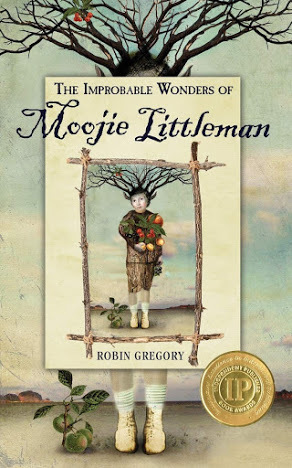 About The Improbable Wonders
of Moojie Littleman
Moojie Littleman is not just another disabled orphan, he is not just a kid who falls into a series of magical, mystical adventures involving goats, bees, and a girl. He is, above all, the most unlikely hero ever known. Through friendship with alien outcasts, Moojie discovers his healing powers and a surprising destiny ... if only he can survive one, last terrifying trial. Welcome to Moojie's mythical world of mayhem and merriment, where miracles are standard fare, mistaken identity is rampant, and the desire to belong can be dangerous. From screenwriter and award-winning novelist, Robin Gregory, comes a masterful debut about family and first love--brimming with compassion, lyricism, and originality. Winner of 24 awards. Buy a CopyMeet the Author
About The Improbable Wonders
of Moojie Littleman
Moojie Littleman is not just another disabled orphan, he is not just a kid who falls into a series of magical, mystical adventures involving goats, bees, and a girl. He is, above all, the most unlikely hero ever known. Through friendship with alien outcasts, Moojie discovers his healing powers and a surprising destiny ... if only he can survive one, last terrifying trial. Welcome to Moojie's mythical world of mayhem and merriment, where miracles are standard fare, mistaken identity is rampant, and the desire to belong can be dangerous. From screenwriter and award-winning novelist, Robin Gregory, comes a masterful debut about family and first love--brimming with compassion, lyricism, and originality. Winner of 24 awards. Buy a CopyMeet the Author
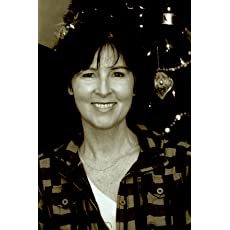
Robin Gregory is a storyteller who was born in Florida, but currently lives in the Land of Oz--California. She was raised amid cowboys and hippies, poppies and rattlesnakes, which frequent her stories. She likes to talk to animals, and sometimes they talk back, but mostly they just eat and poop. Her novels include fainting goats, supernaturals, scoundrels, and a hero in the throes of love. You won't find blood-spurting limbs, vampires, or potty-mouthed dragons. As a rule. You can find her on Twitter @tweety_robin or robingregory.net





